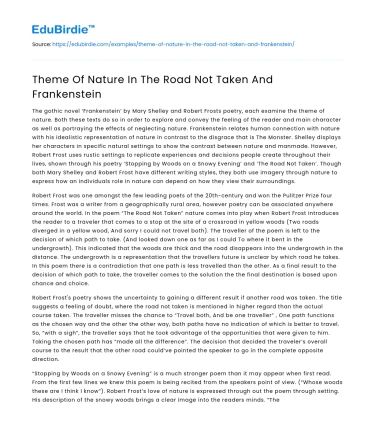The gothic novel ‘Frankenstein’ by Mary Shelley and Robert Frosts poetry, each examine the theme of nature. Both these texts do so in order to explore and convey the feeling of the reader and main character as well as portraying the effects of neglecting nature. Frankenstein relates human connection with nature with his idealistic representation of nature in contrast to the disgrace that is The Monster. Shelley displays her characters in specific natural settings to show the contrast between nature and manmade. However, Robert Frost uses rustic settings to replicate experiences and decisions people create throughout their lives, shown through his poetry ‘Stopping by Woods on a Snowy Evening’ and ‘The Road Not Taken’. Though both Mary Shelley and Robert Frost have different writing styles, they both use imagery through nature to express how an individuals role in nature can depend on how they view their surroundings.
Robert Frost was one amongst the few leading poets of the 20th-century and won the Pulitzer Prize four times. Frost was a writer from a geographically rural area, however poetry can be associated anywhere around the world. In the poem “The Road Not Taken” nature comes into play when Robert Frost introduces the reader to a traveler that comes to a stop at the site of a crossroad in yellow woods (Two roads diverged in a yellow wood, And sorry I could not travel both). The traveller of the poem is left to the decision of which path to take. (And looked down one as far as I could To where it bent in the undergrowth). This indicated that the woods are thick and the road disappears into the undergrowth in the distance. The undergrowth is a representation that the travellers future is unclear by which road he takes. In this poem there is a contradiction that one path is less travelled than the other. As a final result to the decision of which path to take, the traveller comes to the solution the the final destination is based upon chance and choice.
Save your time!
We can take care of your essay
- Proper editing and formatting
- Free revision, title page, and bibliography
- Flexible prices and money-back guarantee
Robert Frost's poetry shows the uncertainty to gaining a different result if another road was taken. The title suggests a feeling of doubt, where the road not taken is mentioned in higher regard than the actual course taken. The traveller misses the chance to “Travel both, And be one traveller” , One path functions as the chosen way and the other the other way, both paths have no indication of which is better to travel. So, “with a sigh”, the traveller says that he took advantage of the opportunities that were given to him. Taking the chosen path has “made all the difference”. The decision that decided the traveler’s overall course to the result that the other road could’ve pointed the speaker to go in the complete opposite direction.
“Stopping by Woods on a Snowy Evening” is a much stronger poem than it may appear when first read. From the first few lines we knew this poem is being recited from the speakers point of view. (“Whose woods these are I think I know”). Robert Frost’s love of nature is expressed through out the poem through setting. His description of the snowy woods brings a clear image into the readers minds. “The woods are lovely, dark and deep”, the way that Robert Frost describes the woods makes it seem as if the reader were actually there. The feel of Robert Frost’s “Stopping by Woods on a Snowy Evening” is set up by “the only other sound’s the sweep, Of easy wind and downy flake” which is the first line in the poem that talks about the actually woods. The traveller sees something in the woods that attracts him making the woods a special place, we don't know what this is though, it may be the tranquility or the unknown. The traveller knows that he is not able to stay though ,(“But I have promises to keep, And miles to go before I sleep”), The traveller doesn't want to leave the woods, but he made other promises that he needs to keep. Robert Frost repeats the last two lines on the poem (“and miles to go before I sleep”), This could be to put emphasis on the significance of the promise that was made, and make the traveller convince himself to leave the woods.
In these two poems, Robert Frost's main focus is on nature, and his perception of the beauty on it. Frost uses nature to communicate his views and to give his poetry more depth. His poems make it easy to image the setting in your mind because of the detail it gives.






 Stuck on your essay?
Stuck on your essay?

